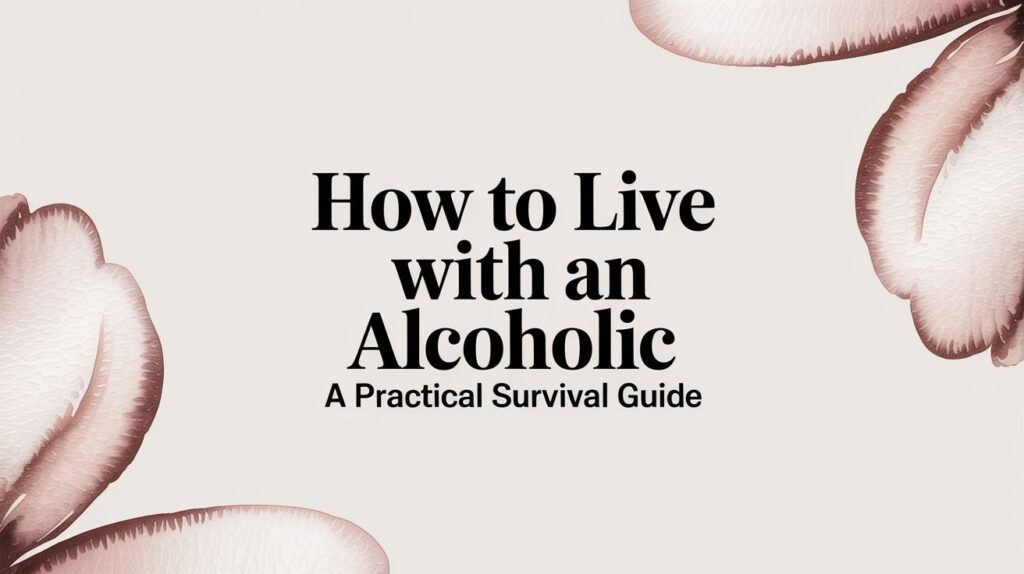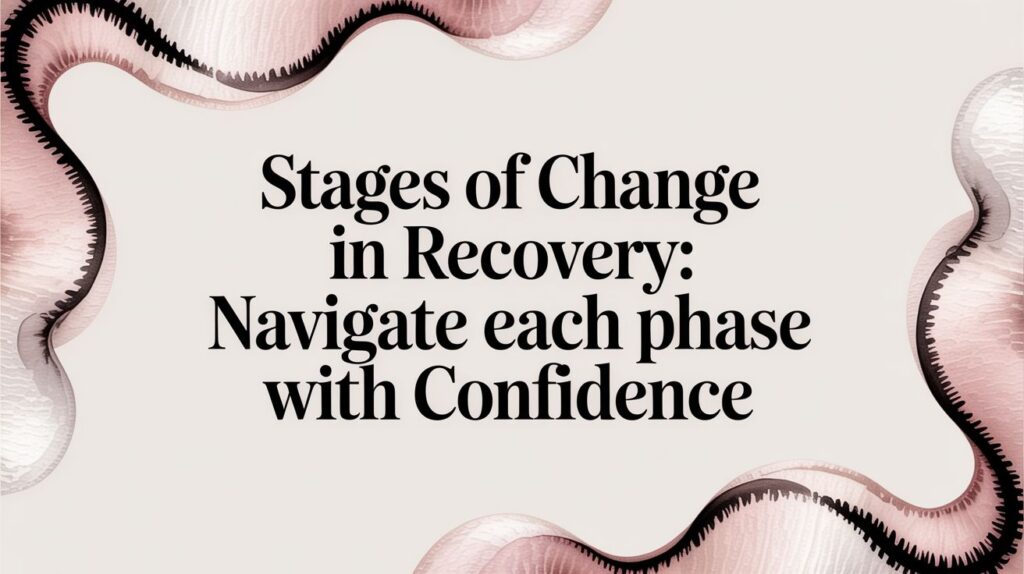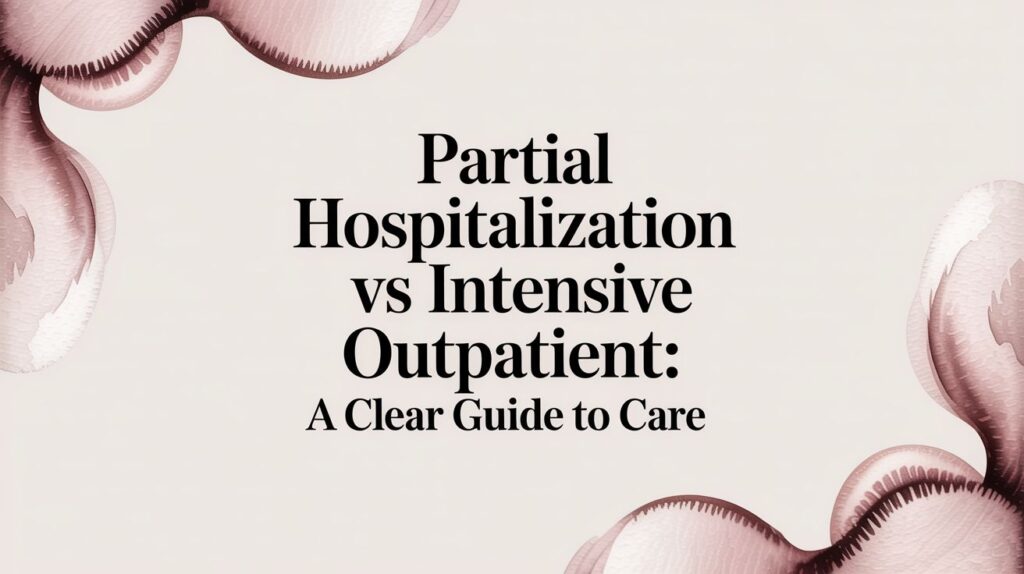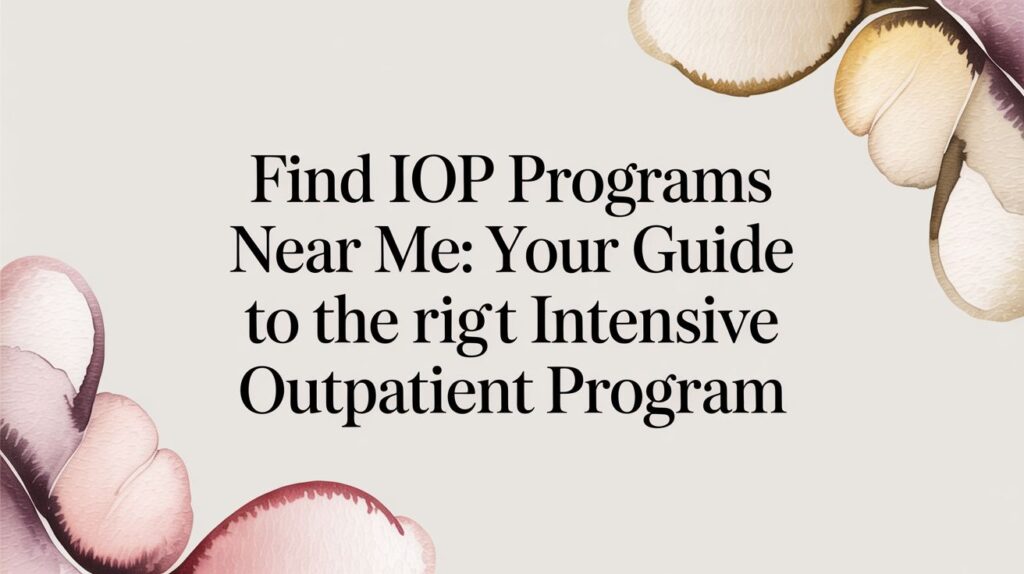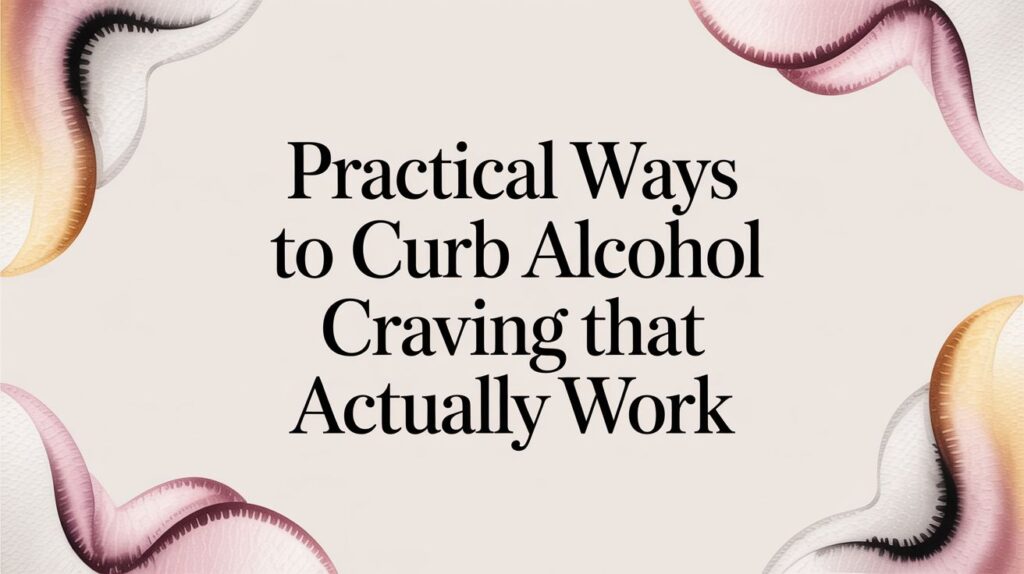When you're living with an alcoholic, your world shrinks. Your focus narrows to one thing: their drinking. But to survive, and even find peace, you have to make a radical shift. The goal isn't to change them—it's to reclaim your own stability. This journey begins with a few crucial first steps centered on protecting yourself.
Your First Steps in a Difficult Situation

Realizing the person you live with is an alcoholic can feel incredibly isolating and confusing. The path forward seems foggy at best. Your first moves aren't about wrestling for control over their addiction, because that's a battle you can't win. Instead, it's about building a solid foundation for your own well-being, no matter what choices they make.
It starts with reframing how you see the problem. You have to learn to separate the person you love from the disease that is dictating their behavior. Creating that emotional distance isn't about caring less; it's a vital act of self-preservation to protect your own mental health from the constant chaos.
Debunking Myths to Find Your Footing
Getting educated is one of the most powerful things you can do right now. Reading a complete guide to behavioral health, understanding care, and support options is a great place to start. Knowledge helps you act strategically instead of just reacting to the latest crisis. A huge part of this is tearing down the common myths that keep people trapped in cycles of guilt, anger, and frustration.
So many of us get tangled up in misconceptions about alcoholism. Let's clear a few of those up right now, because understanding the reality is what allows you to respond effectively.
Myths vs Realities of Living with an Alcoholic
| Common Myth | The Reality | Your Actionable Mindset |
|---|---|---|
| "They can stop if they really loved me." | Alcoholism is a chronic brain disease, not a choice or a lack of willpower. Their inability to stop is a symptom. | Detach their drinking from your self-worth. It's about their illness, not a reflection of your value. |
| "I can fix them if I just try hard enough." | You cannot control another person's addiction. Trying to "manage" it often just enables the behavior. | Focus on what you can control: your reactions, your boundaries, and your own well-being. |
| "It’s a private family matter." | Secrecy and isolation are the perfect breeding ground for addiction. You need outside support to survive this. | Break the silence. Talk to a therapist, find an Al-Anon meeting, or confide in a trusted friend. You don't have to carry this alone. |
Getting a realistic perspective is key to making healthier choices for yourself.
The constant strain of living with an alcoholic partner can absolutely shatter a relationship. In fact, research shows that heavy drinking dramatically increases the likelihood of divorce. The stress is immense, and it’s critical to understand that this situation puts your own health and stability at risk.
Remember, your primary responsibility is to yourself and any children involved. Prioritizing your safety and sanity is not selfish—it is a necessary act of survival.
Understanding Alcoholism as a Disease
To really help someone struggling with alcohol, and to keep yourself sane in the process, the first step is a mental one. You have to stop seeing their drinking as a simple lack of willpower or a moral failing. Alcohol Use Disorder (AUD) is a chronic brain disease, and internalizing that fact is the foundation for everything that comes next.
When a person drinks heavily over a long period, alcohol literally rewires their brain. It hijacks the reward, memory, and decision-making circuits, creating cravings so intense that willpower alone often stands no chance. The broken promises, the arguments, the unreliability you're dealing with? Those are often direct symptoms of these neurological changes.
The Brain and The Bottle
Once you start to grasp the science, you can begin to detach emotionally from the chaos. Viewing the drinking as a symptom of a disease—rather than a personal attack on you—helps dial down the anger and resentment. This isn't about caring less; it's about shifting from a reactive, emotional state to a more strategic one.
This perspective is also crucial for handling the inevitable ups and downs. Relapse is a common feature of chronic diseases, AUD included. When you frame a relapse as a setback in the disease’s progression instead of a personal betrayal, you can respond with a plan instead of just pain. If you want to dig deeper into how this works, our guide on the differences between physical and psychological dependence is a great resource.
The most powerful shift you can make is from asking, "Why are they doing this to me?" to "What is this disease doing to them?" This change in perspective helps you reclaim your emotional energy and focus on what you can actually control.
The Ripple Effect on Family Life
Alcoholism doesn't just affect the person drinking; it sends shockwaves through the entire family, creating a constant state of stress and instability. Relationships get strained to the breaking point.
The toll on marriages is especially severe. The data doesn't lie: alcohol abuse nearly triples the likelihood of divorce. In the United States, where the average adult drinks about 9.4 liters of alcohol each year, studies show that just a one-liter increase in consumption per capita is linked to a 20% jump in divorce rates. These aren't just numbers; they represent the destructive power of this disease on the people who are closest to it.
How to Set Boundaries and Protect Yourself
Living with an alcoholic can feel like being a passenger in a car with no steering wheel. You're constantly bracing for the next swerve, the next unpredictable turn. Setting boundaries is how you get back into the driver's seat of your own life.
Think of boundaries not as a way to control their drinking, but as essential rules you put in place to protect your own safety, sanity, and well-being. This is one of the most powerful and proactive things you can do. It shifts the focus away from their chaotic behavior and back to your own consistent, healthy actions. You’re drawing a line in the sand and deciding what you will and will not tolerate.
It helps to remember you’re dealing with a disease, not just bad behavior.
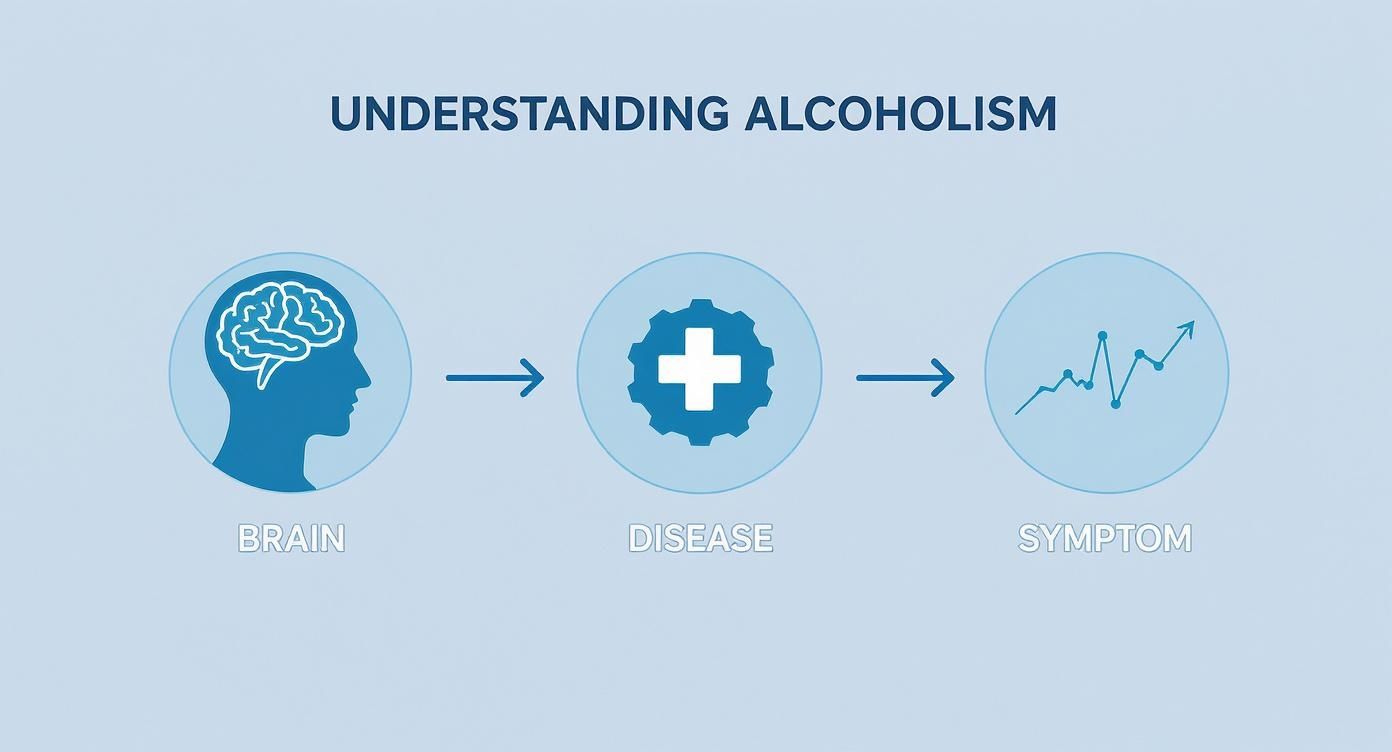
This image shows how alcoholism starts as a brain disease that then leads to erratic symptoms. Seeing this progression can help you set effective boundaries with a little more emotional distance, separating the person you care about from their actions.
Defining Your Non-Negotiables
Your boundaries need to be crystal clear, specific, and communicated calmly—not in the heat of an argument. Start by thinking about the recurring situations that cause you the most pain, frustration, or fear. That’s exactly where you need boundaries the most.
You don't have to fix everything at once. Start small if you need to. The most important part is being consistent and following through.
- Financial Boundaries: Money is often a huge source of conflict. A firm financial boundary means refusing to hand over cash for alcohol or pay off debts racked up because of their drinking. You could say, "I will no longer give you cash, but I’m happy to buy the groceries for the house."
- Emotional Boundaries: This is all about safeguarding your mental health. You have the right to refuse to participate in those circular, nonsensical arguments that happen when they’re intoxicated. A good script is, "I love you and I can see you're upset, but I won't discuss this with you while you're drinking. We can talk about it in the morning when you're sober."
- Physical Boundaries: Your physical space and safety are paramount. A powerful boundary here is stating, "I will not be around you when you're drinking. If you decide to drink tonight, I am going to stay with a friend."
Remember, a boundary without a consequence is just a suggestion. The follow-through is what gives it power and protects you. It teaches the other person that your words have weight and your well-being is not negotiable.
From Words to Action
It's one thing to decide on boundaries; it's another to communicate them. Expect pushback. You might face anger, manipulation, or attempts to make you feel guilty. This is a normal, albeit difficult, reaction when the familiar dynamic in a relationship starts to change.
Your job is to stay firm, stay calm, and repeat your boundary as needed without getting sucked into a fight.
For instance, if they ask you to call their boss and lie for them, a healthy boundary sounds like this: "I'm not comfortable lying for you. That’s a consequence of your drinking that you'll have to handle."
This is where healthy boundaries stop enabling the addiction. The table below shows the difference between a response that fuels the problem and one that supports your well-being.
Examples of Healthy vs Enabling Boundaries
| Situation | Enabling Response (What to Avoid) | Healthy Boundary (What to Do/Say) |
|---|---|---|
| They ask for money for "gas" but you know it's for alcohol. | Giving them cash, hoping they'll use it responsibly. | "I can't give you cash, but I can put gas directly into your car." |
| They start an angry, drunken argument with you. | Yelling back, trying to reason with them, or defending yourself for hours. | "I will not have this conversation while you're intoxicated. We can talk when you're sober." (Then leave the room). |
| They are too hungover to go to work. | Calling their boss for them with an excuse like "they have the flu." | "I'm sorry you're feeling sick, but you'll have to be the one to call your work." |
| They make a mess in the house while intoxicated. | Silently cleaning it up for them before they wake up. | "The mess you made last night is in the kitchen. Please clean it up." |
Holding these lines consistently is what makes them work. Each time you hold firm, you reinforce your commitment to your own health and sanity. It also, crucially, allows the person with the addiction to feel the natural consequences of their actions—a key step that often motivates someone to finally seek help. For a deeper dive, exploring resources on setting boundaries in recovery can offer even more strategies and support.
Stop Enabling and Start Supporting Recovery
There’s a fine—but critical—line between helping someone you love and accidentally enabling their addiction. Many things we do out of love, like calling their boss with an excuse or taking over all the chores to keep the peace, can actually make the situation worse.
These actions, though well-intentioned, shield them from the natural consequences of their drinking. When you consistently clean up their messes, both literal and figurative, you're removing the very friction that might push them to finally get help.
This dynamic isn't just exhausting for you; it can prolong their addiction by making it more comfortable for them to keep going without facing immediate repercussions.
The strain this puts on a relationship is immense. Research makes the connection between addiction and relational breakdown painfully clear, showing that 48.3% of marriages where one person has a lifetime Alcohol Use Disorder end, compared to just 30.1% for couples without it. You can see the details in the full study on AUD and marital stability.
Shifting from Caretaker to Supporter
Pivoting from an enabling role to one of genuine support is one of the most powerful moves you can make. It means stepping back from being the "fixer" and instead becoming a steady beacon for positive change.
It means you stop participating in the chaos. True support is about creating an environment where recovery becomes the most appealing and logical choice.
- Stop making excuses for them. No more calling their boss to say they're "sick" when they’re actually hungover.
- Stop the financial bailouts. Don't give them money for bills they blew off by spending it on alcohol.
- Stop absorbing their responsibilities. Let them face the fallout from a missed appointment or forgotten chore.
Letting these consequences happen isn't cruel. You're letting reality be the teacher, which is often far more persuasive than any lecture or plea you could ever offer.
Practical Ways to Offer Real Support
Constructive support is active, compassionate, and always pointed toward recovery. It’s about offering a hand up, not a handout. This approach empowers them to take responsibility while showing them you're still in their corner.
One of the best ways to do this is to express your concerns during a calm, sober moment. Use "I" statements to explain how their drinking impacts you, which sidesteps blame and shame. For instance, say, "I feel scared when you get behind the wheel after drinking," instead of, "You're so irresponsible for driving drunk."
This simple shift in communication can open the door to a real conversation. You can learn more about fostering change through communication in our guide on what motivational interviewing therapy is and how its principles can help.
Your role can transform from a caretaker of the addiction to a supporter of their recovery. The goal is to support the person, not the disease. This means encouraging steps toward health, like researching treatment options together or offering to attend a family therapy session.
True support is about holding onto hope for their recovery while fiercely protecting your own well-being. By refusing to enable their addiction, you create the space they need to choose a different path for themselves.
Prioritizing Your Own Well-Being

Living in a state of constant crisis takes a real toll. The day-in, day-out stress, anxiety, and hyper-vigilance of life with an alcoholic can drain your physical and emotional reserves until there’s simply nothing left to give.
It’s an old saying, but it’s true: you can’t pour from an empty cup.
Taking care of yourself isn't selfish; it's a non-negotiable survival strategy. Your strength is the only anchor you have in this storm, and it's what will make you capable of offering meaningful support if your loved one ever chooses recovery. This means actively carving out time and energy for your own mental and physical health, starting now.
Building Your External Support System
One of the most powerful moves you can make is finding support for yourself that is completely separate from your home life. Isolation is a quiet, creeping side effect of living with an alcoholic, and you have to consciously break that cycle.
You need a safe place where you can speak honestly without worrying about judgment or fallout. Connecting with people who genuinely get what you're going through can feel like coming up for air after being underwater.
- Seek Professional Therapy: A therapist is your objective ally. They can give you practical tools to manage stress, work through the incredibly complex emotions you're feeling, and reinforce the healthy boundaries you’re trying to build.
- Join a Support Group: Groups like Al-Anon were created specifically for people in your exact situation. Hearing stories that echo your own is incredibly validating. It dissolves the loneliness and offers real-world advice from others who have walked this same path.
Putting yourself first might feel completely unnatural after spending so much time and energy focused on someone else’s problems. Remember, your well-being is not a luxury—it's a requirement for navigating this difficult journey.
Managing Daily Stress and Reclaiming Your Identity
The constant, low-grade stress of this environment has real consequences for your body and mind. It's crucial to acknowledge this and learn more about understanding chronic stress and its physiological impact.
Developing small, daily practices to manage this stress is essential. Just as important is reconnecting with the person you were before the chaos took over. What did you love to do? What hobbies brought you joy? Reclaiming those activities is a powerful way to remind yourself that your identity is separate from their addiction.
You don't need a grand gesture; small, consistent actions make a huge difference. The same kinds of coping skills for substance abuse can be incredibly effective for managing the fallout of living with it. A simple daily walk, a few minutes of mindfulness, or picking up that old guitar can provide a much-needed mental escape and begin to restore your energy.
Common Questions About Living with an Alcoholic
Living with an alcoholic feels like navigating a minefield of confusing and painful questions. The situations can feel impossible, and figuring out the right thing to do is rarely simple. Below are some direct answers to the most common—and most difficult—questions that come up, offering some clarity when you need it most.
Can I Force Them to Get Help?
This is one of the first questions everyone asks, born from desperation and love. The short answer is no. You can’t force an adult into treatment unless they are an immediate, verifiable danger to themselves or others, which usually requires a legal intervention.
The most powerful thing you can do is create an environment where they finally choose to get help. This often happens only after you establish firm boundaries, stop enabling their behavior, and allow them to feel the natural consequences of their drinking.
An intervention, especially when guided by a professional, can be a potent tool to help them see the reality of their situation. But at the end of the day, the decision to accept help is theirs alone. Your power isn't in controlling their choices—it's in controlling your own actions and responses to protect your well-being.
What Is the Difference Between Helping and Enabling?
Drawing this line is absolutely crucial, both for your own sanity and for their chance at recovery. It’s the difference between supporting the person you love and supporting the disease that’s hurting them.
- Helping is about supporting their recovery without shielding them from the fallout of their addiction. It looks like telling them you're concerned when they're sober, offering a ride to a support meeting, or agreeing to participate in family therapy.
- Enabling is any action that protects them from the negative results of their drinking, which just makes it easier for them to keep going. This is calling them in sick to work because they’re hungover, giving them money you know will go to alcohol, or picking up all their responsibilities so their life stays comfortable despite the chaos.
Helping fosters accountability and recovery. Enabling removes consequences and prolongs the addiction. Shifting from enabling to genuine helping is one of the most loving and effective changes you can possibly make.
When Is It Time to Consider Leaving the Relationship?
This is a deeply personal decision, and there’s no easy, one-size-fits-all answer. Your first and most important consideration must always be your safety and the safety of any children involved. If there is any physical, emotional, or verbal abuse, your priority is to get to a safe environment immediately.
Beyond immediate safety, other signs it might be time to leave include:
- A complete and irreparable breakdown of trust.
- Serious financial damage caused by their addiction that you can't recover from.
- A devastating and ongoing negative impact on your own mental and physical health.
The constant stress of living this way can wear you down to nothing. Seeking your own individual therapy can provide the clarity, support, and unbiased perspective you need to navigate this incredibly tough choice. It gives you a dedicated space to put your own needs first and decide what’s truly best for your future.
At Altura Recovery, we understand that addiction affects the entire family. If you're struggling to cope with a loved one's substance use, our family support programs and outpatient services in Houston can provide the guidance and healing you need. Learn more about our compassionate, evidence-based care at https://www.alturarecovery.com.

